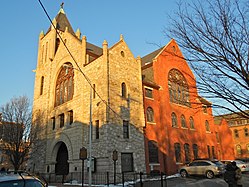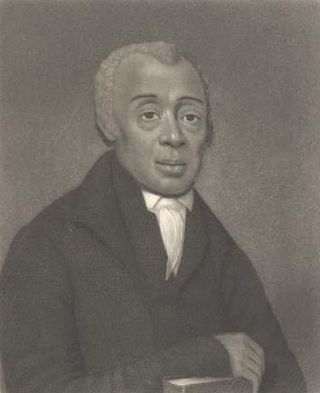
Richard Allen was a minister, educator, writer, and one of the United States' most active and influential black leaders. In 1794, he founded the African Methodist Episcopal Church (AME), the first independent Black denomination in the United States. He opened his first AME church in 1794 in Philadelphia.
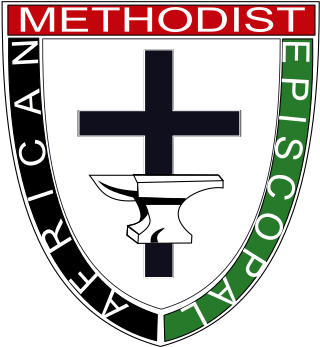
The African Methodist Episcopal Church, usually called the AME Church or AME, is a Methodist Black church. It adheres to Wesleyan-Arminian theology and has a connexional polity. The first independent Protestant denomination to be founded by Black people, AME welcomes and has members of all ethnicities.
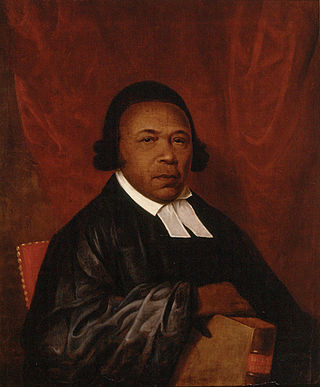
Absalom Jones was an African-American abolitionist and clergyman who became prominent in Philadelphia, Pennsylvania. Disappointed at the racial discrimination he experienced in a local Methodist church, he founded the Free African Society with Richard Allen in 1787, a mutual aid society for African Americans in the city. The Free African Society included many people newly freed from slavery after the American Revolutionary War.
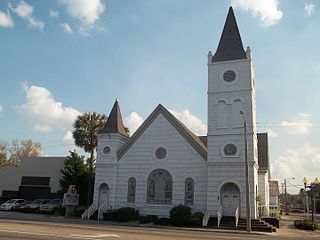
The black church is the faith and body of Christian denominations and congregations in the United States that predominantly minister to, and are also led by African Americans, as well as these churches' collective traditions and members. The term "black church" may also refer to individual congregations, including in traditionally white-led denominations.

Daniel Alexander Payne was an American bishop, educator, college administrator and author. A major shaper of the African Methodist Episcopal Church (AME), Payne stressed education and preparation of ministers and introduced more order in the church, becoming its sixth bishop and serving for more than four decades (1852–1893) as well as becoming one of the founders of Wilberforce University in Ohio in 1856. In 1863, the AME Church bought the college and chose Payne to lead it; he became the first African-American president of a college in the United States and served in that position until 1877.
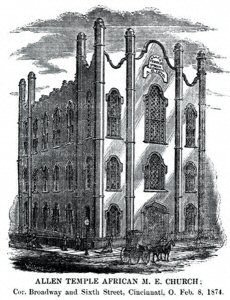
The Allen Temple AME Church in Cincinnati, Ohio, US, is the mother church of the Third Episcopal District of the African Methodist Episcopal Church. Founded in 1824, it is the oldest operating black church in Cincinnati and the largest church of the Third Episcopal District of the AME Church.

St. George's United Methodist Church, located at the corner of 4th and New Streets, in the Old City neighborhood of Philadelphia, is the oldest Methodist church in continuous use in the United States, beginning in 1769. The congregation was founded in 1767, meeting initially in a sail loft on Dock Street, and in 1769 it purchased the shell of a building which had been erected in 1763 by a German Reformed congregation. At this time, Methodists had not yet broken away from the Anglican Church and the Methodist Episcopal Church was not founded until 1784.
Black Methodism in the United States is the Methodist tradition within the Black Church, largely consisting of congregations in the African Methodist Episcopal (AME), African Methodist Episcopal Zion, Christian Methodist Episcopal denominations, as well as those African American congregations in other Methodist denominations, such as the Free Methodist Church.

The St. Paul A.M.E. Church is a historic American Gothic Revival style African Methodist Episcopal Church located in Raleigh, North Carolina. A red brick and frame structure built in 1884 by black masons, St. Paul's was the first independent congregation of African Americans in Raleigh and is the oldest African-American church in Wake County, North Carolina. Before the end of the Civil War, the future founders of St. Paul's had been slave members of the Edenton Street United Methodist Church. The members of the church began calling their congregation "St. Paul's" in 1848. The church was listed on the National Register of Historic Places in November 1987 and is also a Raleigh Historic Landmark.

Bethel AME Church, now known as the Central Pennsylvania African American Museum, is a historic African Methodist Episcopal church at 119 North 10th Street in Reading, Berks County, Pennsylvania. It was originally built in 1837, and is a 2½-storey brick and stucco building with a gable roof. It was rebuilt about 1867–1869, and remodeled in 1889. It features a three-storey brick tower with a pyramidal roof topped by a finial. The church is known to have housed fugitive slaves and the congregation was active in the Underground Railroad. The church is now home to a museum dedicated to the history of African Americans in Central Pennsylvania.

Bethel African Methodist Episcopal Church is a historic African Methodist Episcopal Church in Springtown, New Jersey, United States. The church was part of two free negro communities, Othello and Springtown, established by local Quaker families, like the Van Leer Family. The congregation was established in 1810 in Greenwich Township as the African Methodist Society and joined the African Methodist Episcopal Church in 1817. A previous church building was burned down in the 1830s in an arson incident and the current structure was built between 1838 and 1841.

Wesley A.M.E. Zion Church is an historic church, which is located at 1500 Lombard Street in Philadelphia, Pennsylvania. Added to the National Register of Historic Places in 1978, it also appears in the Philadelphia Register of Historic Places and the Pennsylvania State Historic Resource survey.

The British Methodist Episcopal (BME) Church, Salem Chapel was founded in 1820 by African-American freedom seekers in St. Catharines, Ontario. It is located at 92 Geneva St., in the heart of Old St. Catharines. The church is a valued historical site due to its design, and its important associations with abolitionist activity.

The Bethel A.M.E. Church, known in its early years as Indianapolis Station or the Vermont Street Church, is a historic African Methodist Episcopal Church in Indianapolis, Indiana. Organized in 1836, it is the city's oldest African-American congregation. The three-story church on West Vermont Street dates to 1869 and was added to the National Register in 1991. The surrounding neighborhood, once the heart of downtown Indianapolis's African American community, significantly changed with post-World War II urban development that included new hotels, apartments, office space, museums, and the Indiana University–Purdue University at Indianapolis campus. In 2016 the congregation sold their deteriorating church, which will be used in a future commercial development. The congregation built a new worship center at 6417 Zionsville Road in Pike Township in northwest Indianapolis.

Emanuel African Methodist Episcopal Church, colloquially Mother Emanuel, is a church in Charleston, South Carolina, founded in 1817. It is the oldest AME church in the Southern United States; founded the previous year in Philadelphia, Pennsylvania, AME was the first independent black denomination in the nation. Mother Emanuel has one of the oldest black congregations south of Baltimore.
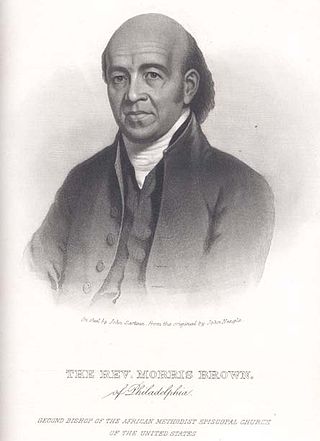
Morris Brown was one of the founders of the African Methodist Episcopal Church, and its second presiding bishop. He founded Emanuel AME Church in his native Charleston, South Carolina. It was implicated in the slave uprising planned by Denmark Vesey, also of this church, and after that was suppressed, Brown was imprisoned for nearly a year. He was never convicted of a crime.
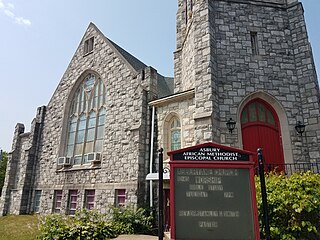
Asbury AME Church is an African Methodist Episcopal Church founded in 1845 in Chester, Delaware County, Pennsylvania, United States. It is the second African Methodist Episcopal church founded in Chester behind the Union African Methodist Church in 1832. Asbury AME Church is located at 1712 Providence Avenue and is an active worship center.

The First African Baptist Church is a church located in South Philadelphia, Pennsylvania founded in 1809. It was the first African American Baptist congregation in Philadelphia and Pennsylvania, and the fifth African American congregation to be founded in Philadelphia. It was founded by 13 former congregants of the primarily white First Baptist Church of Philadelphia whom were ex-slaves from the eastern shore of Virginia. The split was cordial with the Church being immediately recognized by the Philadelphia Baptist Association. The church went through three locations in the Spring Garden neighborhood, and then to a location in the current Chinatown neighborhood of Philadelphia.

Mount Zion A.M.E. Church is a historic African American church in Tredyffrin Township, Chester County, Pennsylvania. Built in 1880 and expanded in 1906, Mount Zion was listed on the National Register of Historic Places on January 27, 2015. It was an important community gathering place for African Americans battling racial segregation of local schools in the 1930s.
